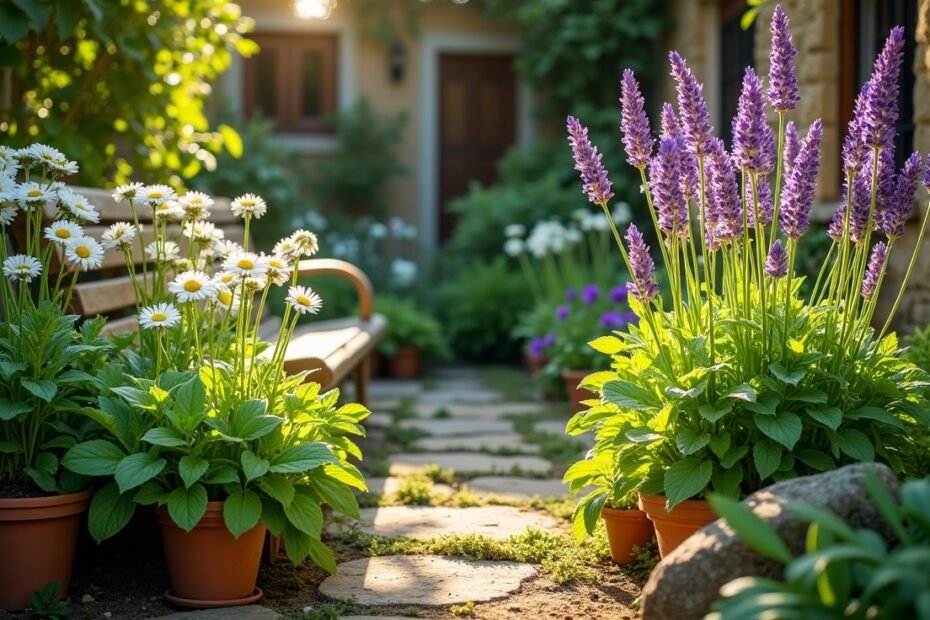Transforming your garden into a natural pharmacy is easier than you might think. By growing medicinal herbs at home, you can access natural remedies, enhance your health, and enjoy the satisfaction of cultivating your own herbal treatments. This approach not only reduces reliance on store-bought products but also connects you to traditional practices rooted in centuries of herbal wisdom.
Growing Medicinal Herbs in Your Garden
Successful herbal gardening starts with selecting the right plants and creating an environment in which they can thrive. Many medicinal herbs are well-suited for home gardens due to their adaptability and low maintenance needs.
Essential Herbs to Cultivate
- Chamomile: Known for its calming effects, chamomile is ideal for teas that aid in relaxation and digestion.
- Mint: A versatile herb that can be used in teas, salves, and even culinary dishes, mint also supports digestive health.
- Lavender: With a soothing aroma, lavender is popular in aromatherapy and can be used to make calming oils and tinctures.
- Basil: Beyond its culinary uses, basil has anti-inflammatory properties and can be transformed into herbal remedies.
- Echinacea: Renowned for boosting the immune system, echinacea is a favorite for natural cold and flu remedies.
Tips for Successful Cultivation
- Soil Preparation: Use nutrient-rich, well-draining soil. Consider composting organic waste to enhance soil fertility.
- Sunlight: Most medicinal herbs need full sun to partial shade. Ensure your garden spot provides adequate light.
- Watering: Maintain consistent moisture levels, but avoid overwatering to prevent root rot.
- Organic Practices: Avoid synthetic pesticides and fertilizers to preserve the natural potency of your herbs.
Crafting Natural Remedies
Once your garden is thriving, the next step is transforming fresh herbs into remedies that can support your well-being. Traditional methods such as teas, tinctures, and salves harness the natural benefits of these plants.
Herbal Teas and Infusions
- Simple Herbal Tea: Steep fresh or dried chamomile or mint leaves in boiling water for 5–10 minutes. Sweeten with a little honey if desired.
- Detox Infusion: Combine a mixture of basil, mint, and lemon balm to create a refreshing detox drink that aids digestion and boosts energy.
Tinctures and Extracts
- Basic Tincture: Chop your chosen herb (such as echinacea) and place it in a jar. Cover with high-proof alcohol, seal, and store in a dark place for 4–6 weeks. Strain and store the liquid in a dark bottle.
- Usage: Tinctures are concentrated; typically, a few drops diluted in water are sufficient.
Salves and Ointments
- Herbal Salve: Infuse dried lavender or chamomile in olive oil over low heat for several hours. Strain and mix with beeswax in a 4:1 ratio (oil to wax) to create a soothing salve ideal for minor skin irritations.
- Application: Apply directly to the affected area for relief from minor burns, cuts, or irritations.
Integrating Traditional Wisdom with Modern Techniques
While traditional methods are at the core of herbal remedies, modern science has validated many of these practices. Studies from institutions like NIH and Mayo Clinic support the efficacy of herbal treatments for various ailments. By combining time-honored techniques with modern research, you can create effective, natural remedies with confidence.
- Research and Experimentation: Keep a garden journal to track the growth, harvest times, and efficacy of your herbal remedies.
- Community Resources: Join local or online herbalist communities to share recipes and learn new methods.
- Sustainability: Cultivate your herbs organically to maintain the purity of your remedies and support environmental health.
FAQ: Herbal Remedies from Your Garden
- What are the benefits of growing medicinal herbs at home?
Growing your own herbs provides fresh, potent remedies, reduces reliance on commercial products, and promotes a sustainable lifestyle. - Which herbs are best for beginners?
Chamomile, mint, and lavender are excellent choices for beginners due to their ease of growth and versatility in remedies. - How do I make a basic herbal tincture?
Chop the herb, cover it with high-proof alcohol in a jar, and let it steep for 4–6 weeks. Strain and store the liquid in a dark bottle. - Can I use herbal remedies safely?
Yes, when prepared correctly, herbal remedies are safe for minor ailments. However, it’s important to research each herb and, if necessary, consult with a professional. - Where can I find more information on herbal medicine?
Reliable sources include NIH, Mayo Clinic, and reputable herbalist organizations.
Conclusion
Transform your garden into a natural pharmacy by cultivating medicinal herbs and creating your own herbal remedies. This hands-on approach not only nurtures your well-being but also reconnects you with nature’s healing powers. Embrace the art of herbal medicine, experiment with recipes, and enjoy the benefits of a healthier, more sustainable lifestyle. Start your herbal journey today and experience the magic of natural remedies!
Read also: How to Dry and Store Medicinal Herbs at Home: Top 3 Methods
